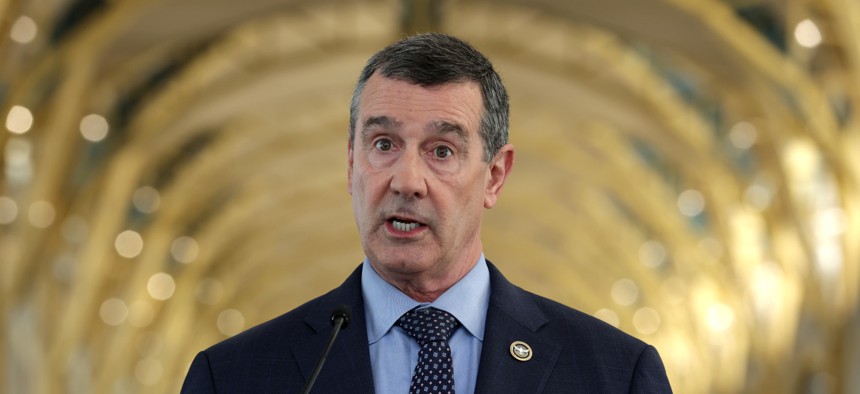
Transportation Security Administrator David Pekoske told a House subcommittee this week that morale at the agency has improved following pay and workplace improvements. Alex Wong / GETTY IMAGES
Pekoske touts impact of pay increases at TSA budget hearing
Workforce attrition has halved since the implementation of a new pay system that mirrors the General Schedule, while employee morale has reached its highest ever, according to the annual Federal Employee Viewpoint Survey.
Transportation Security Administrator David Pekoske on Tuesday urged lawmakers to continue to support the Biden administration’s recent efforts to improve the pay and workplace conditions of airport screeners as they move through the fiscal 2024 appropriations process.
Pekoske testified before a House Appropriations subcommittee on the White House’s fiscal 2025 budget request for the Transportation Security Administration, thanking lawmakers for “fully annualizing” the agency’s new compensation system, which was first implemented using $400 million from the fiscal 2023 omnibus spending package.
Between TSA’s inception following the Sept. 11, 2001, terrorist attacks until 2023, TSA employees were part of a siloed personnel system, where they did not receive regular raises like most other federal workers and lacked due process and whistleblower protections. The Obama administration had granted the workforce abridged collective bargaining rights, which also have since been expanded by President Biden to mirror the rights of Title 5 employees.
The pay raises and the resulting improvement in worker rights have already paid dividends, Pekoske said. Since their implementation, the agency’s attrition dropped from nearly 20% to 11% today. And last year, the agency’s employee engagement score in the annual Federal Employee Viewpoint Survey ticked up 4 percentage points to its highest level ever.
“Since the new compensation plan was implemented in the first quarter of fiscal 2023, it has had enormous positive impacts on TSA,” he said. “Our retention is up, we have many more candidates applying to open positions and morale has noticeably improved, as reflected in the highest ever FEVS results in TSA’s history.”
Pekoske urged lawmakers to continue to support the Biden administration’s pay regime for TSA, and offered a potential funding source: ending the diversion of $1.6 billion each year in revenue from airfare fees directly into the U.S. Treasury, originally enacted as part of the 2013 Bipartisan Budget Act. That diversion of fees is slated to sunset in 2027.
“We should restore all of the 9/11 airline fee revenue to go toward aviation security, as originally intended,” Pekoske said. “That diversion began in 2013 and is set to expire in 2027, but ending it early in fiscal 2025 would allow us more flexibility in both our capital and operations accounts, better staff for the growth in passenger volume, among other requirements.”
Committee Republicans asked Pekoske about the status of TSA’s program by which some federal air marshals have been deployed to aid U.S. Customs and Border Protection with operations along the U.S.-Mexico border, suggesting that those employees are being “diverted” away from protecting the flying public. Pekoske said that last year, air marshals deployed to the southern border amounted to less than 2% of the air marshals who provided security on flights.
“The concern is [air marshals are] supposed to keep the flying public safe—that’s their mission, their duty, and any instance they’re pulled away is a morale problem,” said Rep. Ashley Hinson, R-Iowa. “Long term, that’s a huge recruitment problem if people are coming into this job thinking that they’re keeping the sky safe, and instead they’re diverted to the southern border.”
“I don’t necessarily think that view reflects the view of the Air Marshal Service,” Pekoske responded. “At the deployments we’ve had, all of the federal air marshals were volunteers. If they felt it was not a good use of their expertise, they wouldn’t volunteer. The only ones we’ve had to direct were some supervisors, but a very small number of the total.”
Rep. Peter Cuellar, D-Texas, said that while he supports organized labor, he worried that TSA employees’ newly expanded collective bargaining rights could be coming ahead of customer demand at times when there is a surge in air travel.
“I support unions, but I want to make sure we put customers first, especially at peak times,” he said.
Pekoske noted that TSA only recently reached an accord on a new collective bargaining agreement with the American Federation of Government Employees—so recently that it is still under agency head review and not yet implemented—and suggested that the way to meet demand is to ensure the agency’s workforce is large enough to handle passenger surges, not curtailing union rights. He also noted he has a cadre of nearly 700 TSA screeners who have volunteered to travel to help out with increased passenger volume associated with special events, such as the Super Bowl.
“When we ask for additional Transportation Security Officers, I’d really like to get to a point where we have a little more flexibility in our numbers,” Pekoske said. “It’s a very sharp pencil to figure out exactly how many we need, but life doesn’t work that way. People get sick, and so on. And then, as with any workforce, if you have a workforce and never provide them any free time or vacation, that impacts their availability in other ways anyway. So what I’d like to do is build up the size of the workforce a little bit more to provide that flexibility.”







